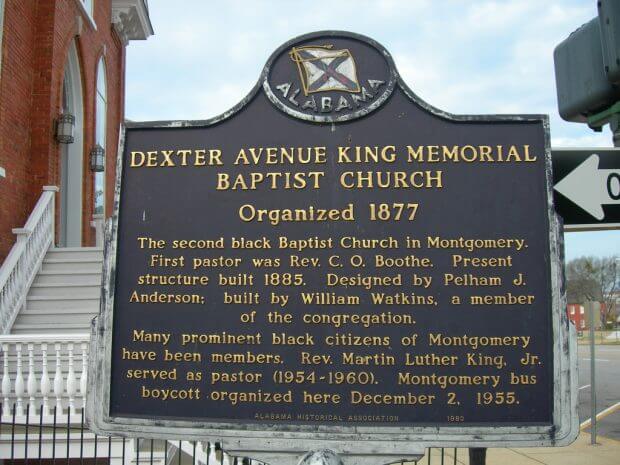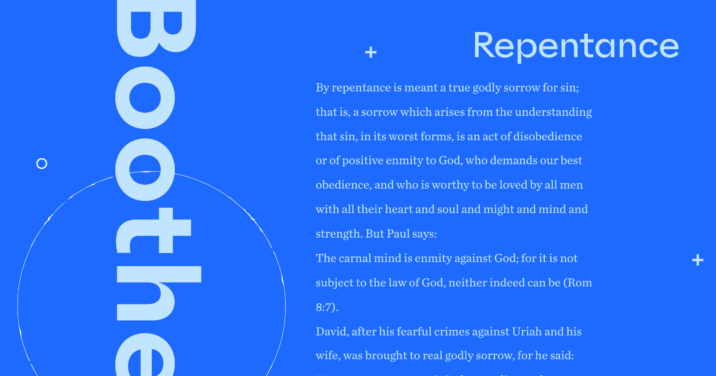Charles Octavius Boothe (1845–1924), was born into slavery in Alabama, but went on to become a pastor, educator, and activist. He established and pastored Dexter Avenue Baptist Church in Montgomery, Alabama, which would later be pastored by Martin Luther King Jr. and renamed Dexter Avenue King Memorial Baptist Church.

Boothe also helped found Selma University and served as its second president. He was the editor of The Baptist Pioneer, and promoted literacy programs and theological training for black preachers and laypeople. In 1890, to further this mission, he published a systematic theology titled Plain Theology for Plain People. It was his aim for the book that “simplicity should prevail—simplicity of arrangement and simplicity of language” so that even the average sharecropper could understand it.
This simplicity—without sacrificing depth—is on display in the excerpt below from Plain Theology for Plain People. In this brief excerpt, Boothe answers the question, “What is repentance?”
***
By repentance is meant a true godly sorrow for sin; that is, a sorrow which arises from the understanding that sin, in its worst forms, is an act of disobedience or of positive enmity to God, who demands our best obedience, and who is worthy to be loved by all men with all their heart and soul and might and mind and strength. But Paul says:
The carnal mind is enmity against God; for it is not subject to the law of God, neither indeed can be (Rom 8:7).
David, after his fearful crimes against Uriah and his wife, was brought to real godly sorrow, for he said:
Have mercy upon me, O God, according to thy lovingkindness: according unto the multitude of thy tender mercies blot out my transgressions. Wash me thoroughly from mine iniquity, and cleanse me from my sin. For I acknowledge my transgressions: and my sin is ever before me. Against thee, thee only, have I sinned, and done this evil in thy sight (Psa 51:14).
He did not mean to say that he had committed no crime against his faithful soldier and his wife; but his sense of the majesty and glory of God, and of the obedience that was due to him, was so great that, for the time being, he was overwhelmed with shame and sorrow on that account, and appears scarcely able to think of anything else.
It will be seen that there is in a sinner’s repentance toward God a new view, and a true view, of the character of God and what is due to him, and also a new view, and a true view, of himself and of the folly and wickedness of his own wrong thoughts of God, of his neglect of him, his disobedience and his enmity to him. This is a complete change of mind in regard to God and in regard to what his own feelings and conduct toward God ought to have been. A great change has taken place when one can say: “What God says of himself and of his just claims, and of me and of my opposition to these claims, is all true.”
One who can say this cannot help feeling deep sorrow and a real desire to make a change, which means a real desire to lead a new life, in which God’s will shall rule and his will shall be submitted to the will of God. All this means confession, honest confession of sin, which is simply saying about his former life, his thoughts and feelings and actions toward God, exactly what God says about them. This is what is meant by John when he writes:
If we confess our sins, he is faithful and just to forgive us our sins, and to cleanse us from all unrighteousness (1 John 1:9).
***
This article is adapted from Plain Theology for Plain People by Charles Octavius Boothe (Lexham, 2017).
Walter R. Strickland II and Lexham Press brought Plain Theology back into print for the first time since its original publication. In the excerpt below, from his introduction, Strickland lists several reasons why it was important to bring this volume to light again, and how it benefits believers and the church even today:
Plain Theology for Plain People destroys reductionist stereotypes of black faith. Many are unfamiliar with the African American theological heritage because of its limited corpus. Black Christianity is largely an oral tradition, and its written resources have been obscured by racial bias. Today, as in Boothe’s time, many tend to caricature black Christian faith as merely “religious feeling and fervor.”
Plain Theology for Plain People shows black evangelicals that they belong in the broad evangelical tradition. Many thoughtful black Christians—often educated in evangelical universities and seminaries—have an enduring sense of homelessness in the evangelical tradition. Their ancestors are seldom, if ever, included as contributors to Evangelicalism. Boothe offers a window into an underexplored vista of theological expression. Black evangelicals have equal claim to the evangelical tradition—even though evangelicals have historically muted their voice.
Plain Theology for Plain People requires evangelicals to engage non-white theological voices. Because evangelical biblical and theological studies have excluded the voices of racial minorities, evangelical theology is shaped by the concerns of the dominant culture. Unfortunately, white evangelicals only hear minority evangelicals’ theology if it echoes white evangelical voices.
Unity in Christ demands an openness to collaboration and to mutual sharpening in the theological task. Evangelicals often presume that the task of theology is merely to comprehend God. But the goal of theology is wisdom—a lived demonstration of knowing God. God, not context, has ultimate authority, and yet wisdom demands understanding the context in which Christians live and God works.
Christians need Christians from different cultural, historical, and socio-economic contexts to develop wisdom. Boothe grappled with God’s relation to late-nineteenth-century black life—including economic disenfranchisement, lynching terror, and legal segregation. Chronological and cultural distance allows readers today to see how Boothe embodied divine wisdom in his context. As a result, believers are encouraged by God’s actions in the past: the Lord God is faithful in every circumstance.
Plain Theology for Plain People exemplifies how the Bible informs Christian doctrine. Systematic theologians continually fight the temptation to conform Scripture to a theological system (be it Reformed Theology, Liberation Theology, or Neo-Orthodox Theology). While every theological paradigm ought to be based on Scripture, not every verse fits neatly into a system. With his audience in mind, Boothe reinforces the sufficiency of Scripture by giving an organized account of how Scripture informs Christian doctrine. Through his biblical centrality Boothe circumvents the theological skirmishes of the academy. Like Boothe, theologians today must make the lofty ideas of theology plain to common Christians.






